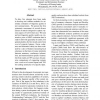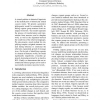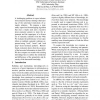ACL
2010
13 years 10 months ago
2010
As described in this paper, we propose a new automatic evaluation method for machine translation using noun-phrase chunking. Our method correctly determines the matching words bet...
ACL
2010
13 years 10 months ago
2010
Bilingual lexicons are fundamental resources. Modern automated lexicon generation methods usually require parallel corpora, which are not available for most language pairs. Lexico...
ACL
2010
13 years 10 months ago
2010
In recent years, research in natural language processing has increasingly focused on normalizing SMS messages. Different well-defined approaches have been proposed, but the proble...
ACL
2010
13 years 10 months ago
2010
To date, few attempts have been made to develop and validate methods for automatic evaluation of linguistic quality in text summarization. We present the first systematic assessme...
ACL
2010
13 years 10 months ago
2010
A central problem in historical linguistics is the identification of historically related cognate words. We present a generative phylogenetic model for automatically inducing cogn...
ACL
2010
13 years 10 months ago
2010
We present an approach to multilingual grammar induction that exploits a phylogeny-structured model of parameter drift. Our method does not require any translated texts or token-l...
ACL
2010
13 years 10 months ago
2010
An important relation in information extraction is the part-whole relation. Ontological studies mention several types of this relation. In this paper, we show that the traditional...
ACL
2010
13 years 10 months ago
2010
This paper proposes to use monolingual collocations to improve Statistical Machine Translation (SMT). We make use of the collocation probabilities, which are estimated from monoli...
ACL
2010
13 years 10 months ago
2010
A challenging problem in open information extraction and text mining is the learning of the selectional restrictions of semantic relations. We propose a minimally supervised boots...
ACL
2010
13 years 10 months ago
2010
In a previous work of ours Chinnakotla et al. (2010) we introduced a novel framework for Pseudo-Relevance Feedback (PRF) called MultiPRF. Given a query in one language called Sour...



